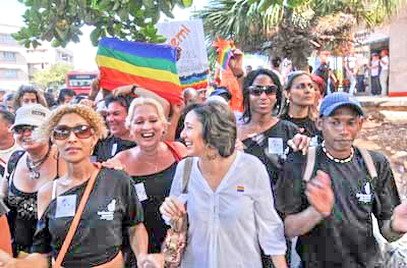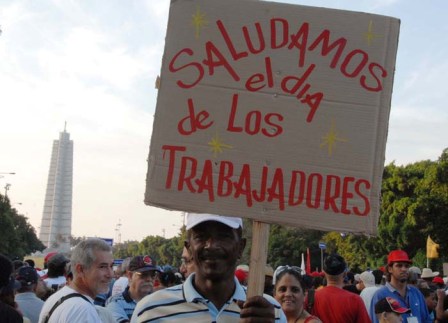Want to know what a sustainable climate-change-proof agricultural system might look like? Here’s an example from Cuba, in an academic paper written by my friend, comrade and former boss, Peter Rosset, together with folk from Cuba’s peasant agriculture movement. The article’s free to download (for now), but the key parts from the abstract are:
Our key findings are (i) the spread of agroecology was rapid and successful largely due to the social process methodology and social movement dynamics, (ii) farming practices evolved over time and contributed to significantly increased relative and absolute production by the peasant sector, and (iii) those practices resulted in additional benefits including resilience to climate change.
latin america
Debate on Bolivia: Government, social movements and revolution

[The following article is a reply to Jeffery Webber's article, “Bolivia’s reconstituted neolib
Sexual self-determination in socialist Cuba: An interview with CENESEX director Mariela Castro Espín

CENESEX director Mariela Castro Espín (centre).
March 23, 2011 – Links International Journal of Socialist Renewal -- In Cuba, there is a LGBTT [lesbian, gay, bisexual, transvestite, transsexual] movement whose gestation is found at the intersection of the state and organised civil society. This movement seeks to tackle the main themes of LGBTT reality from the perspective of human rights, health and social integration, while inserting itself into the national project of a just society. Historically, the space for its existence was provided by the country’s women’s movement, which was largely responsible for making Cuba, in 2008, the first country in the Americas to have sex-change operations included in the universal health-care system.
Immanuel Wallerstein: Libya and the world left

By Immanuel Wallerstein
March 15, 2011 -- There is so much hypocrisy and so much confused analysis about what is going on in Libya that one hardly knows where to begin. The most neglected aspect of the situation is the deep division in the world left. Several left Latin American states, and most notably Venezuela, are fulsome in their support of Colonel Gaddafi. But the spokespersons of the world left in the Middle East, Asia, Africa, Europe and indeed North America, decidedly don’t agree.
Hugo Chavez’s analysis seems to focus primarily, indeed exclusively, on the fact that the United States and western Europe have been issuing threats and condemnations of the Gaddafi regime. Gaddafi, Chavez and some others insist that the Western world wishes to invade Libya and “steal” Libya’s oil. The whole analysis misses entirely what has been happening, and reflects badly on Chavez’s judgment – and indeed on his reputation with the rest of the world left.
First Egypt, next Venezuela? The real threat to democracy in Venezuela comes from Washington

"The Arab revolt represents both an 'economic revolt' and a 'democratic, nationalist and anti-colonial revolution', Santiago Alba Rico and Alma Allende said, that 'provides the socialist left and pan-Arabists in the region with an unexpected opportunity'. They said: 'the Arab people, who have returned to the world stage, need the support of their Latin American brothers'."
By Kiraz Janicke and Federico Fuentes
`Foro Social Latinamericano', Green Left Weekly's Spanish-language supplement, February 2011 issue
The tide of rebellion and revolution now sweeping Latin America is posing a serious challenge to imperialism’s brutal global rule. For anyone who wants an end to war, exploitation and oppression, Latin America’s struggles to create alternatives are crucially important.
Australia's leading socialist newspaper Green Left Weekly is strongly committed to supporting the growing “people’s power” movement in Latin America. Through our weekly articles on developments in the region, GLW strives to counter the corporate media’s many lies about Latin America’s revolutions, and to give a voice in English to the people’s movements for change.
Cuba: El sindicato Australian Workers Union se arrodilla ante Washington

[English at http://links.org.au/node/2122.]
Por Tim Anderson
En este mes de enero, el Sindicato de Trabajadores Australianos (AWU—Australian Workers Union) escribió una carta insultante al nuevo embajador cubano en Australia, Pedro Monzón. El documento del sindicato revela la dominación ideológica que Estados Unidos mantiene sobre las partes más débiles y dóciles del movimiento sindical australiano.
El embajador Monzón, llegado a Australia a finales de 2010, invitó a varios dirigentes sindicales para un intercambio. Paul Howes, como Secretario Nacional del AWU, le replicó de manera innecesariamente ofensiva: ‘Estaría encantado de aceptar su oferta de encuentro, pero, desafortunadamente, sólo podrá llevarse a cabo cuando el gobierno cubano cese la represión de los sindicatos independientes y libere los numerosos dirigentes sindicales actualmente encarcelados en su país.’ En la carta se menciona a cinco encarcelados.
Venezuela: United Socialist Party of Venezuela defines new strategies
By Tamara Pearson, Mérida
January 24, 2011 — Venezuelanalysis.com — On Janurary 21, 2011, over one thousand members of the United Socialist Party of Venezuela (PSUV) met with President Chavez and decided on five key strategic lines for the next two years. The discussion included recognition of important weaknesses in the party and steps for activating the Patriotic Pole coalition.
Chavez, president of Venezuela and also of the governing PSUV, presented the document, Strategic Lines of Political Action of the PSUV for 2011-2012 to the “National Assembly of Socialists” in Vargas state, where around 1440 party leaders were present.
Chavez originally proposed the strategic lines in a draft document in December last year to a meeting of the national PSUV leadership.
PSUV legislator Jesus Farias, speaking to YVKE, said the idea of the “Socialist Assembly” was to “relaunch the project that the PSUV represents, in unity with other political organisations and social groups”. He said the “reflection and establishment of new lines of action for the PSUV is related to a need to strengthen the party as a great machine of agitation and propaganda”.
Cuba: Australian Workers Union tips its hat to Washington

More than a million Cuban workers mobilise each year on May Day, organised by the Central de Trabajadores de Cuba trade union federation.
[See also "Cuban trade unionist: `Workers are key participants in the Cuban revolution'".]
By Tim Anderson
January 26, 2011 -- This January the Australian Workers Union (AWU) wrote an insulting letter to the new Cuban ambassador to Australia, Pedro Monzón. The union’s response shows the tight ideological hold that the US has over the weaker, more compliant sections of the trade union movement in Australia.

The following article was recommended by Raj Patel. Patel writes:
Bolivia: Fuel subsidy backdown reveals pressures on Morales

Protest against fuel subsidy cut, El Alto, December 30.
By Federico Fuentes
January 24, 2011 -- Green Left Weekly -- On December 31, the Bolivian government of President Evo Morales repealed a decree, passed five days earlier, to remove subsidies for fuel. The repeal came after protests and discontent at the resulting price increases from many of the government’s poor supporters.
“Why is the government making us suffer during these days … I don’t understand, I don’t understand”, Carla, a housewife in El Alto told Radio Atipiri on New Years Eve. An elderly woman expressed the shock of many supporters of Bolivia’s first indigenous president: “We are poor, we don’t have anything, what are we going to now, Evo has betrayed us, he must go.”
They were among the many that came out against the government’s decree, which sent petrol and diesel prices up by 73% and 83% respectively. It also caused spikes in the price of transport and food.
Camila Piñeiro Harnecker: `Cuba needs changes, to take us forward rather than backwards'

Cuban workers march on May Day 2009. Photo by Bill Hackwell/Havana Times.
Haiti: Diplomat delivers searing indictment of occupation regime

January 9, 2011 -- Socialist Voice -- Of all the commentaries and interviews coinciding with the anniversary of Haiti’s earthquake, none are likely to exceed in significance the interview granted by Organization of American States representative to Haiti, Ricardo Seitenfus, to the Swiss daily Le Temps on December 20, 2010.
The critique he delivered to the newspaper is especially significant for Latin America and the Caribbean because Seitenfus is Brazilian. Sensitivity is running high in the region over the evident failure of the international relief effort led by the big powers – the United States, Canada and Europe – whose interventionist policies had already done so much harm to Haiti before this latest catastrophe.